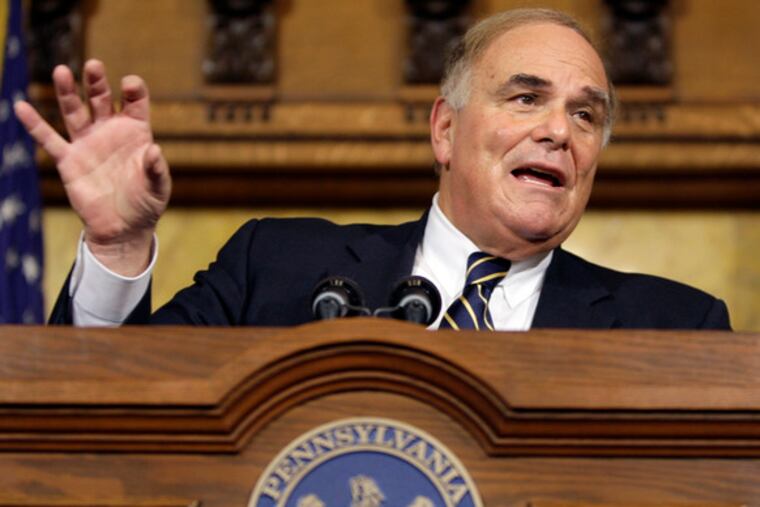
Harrisburg has two problems looming - a budget gap and a credibility gap.
The state's finances are in bad shape, and getting worse. The weak economy has caused collections of the state sales tax and corporate taxes to plummet. If the recession deepens, as expected, Pennsylvania's budget deficit will easily top $1 billion by next summer.
Gov. Rendell has ordered spending cuts, but said he can't rule out a general tax increase, such as raising the 3.07-percent personal income tax rate. House Appropriations Chairman Dwight Evans (D., Phila.) prefers to borrow money, noting the state's relatively low level of indebtedness and its strong credit rating.
Depending on how bad the recession gets, raising taxes or putting the state deeper into debt might become unavoidable. But there's a hitch with either option.
Officials in Harrisburg simply haven't shown they are competent stewards of the people's money.
Elected officials would like to forget it, but taxpayers still remember the legislative pay raise of 2005, approved in the dead of night and rescinded later in shame.
For the past two months, the public has been treated to daily allegations in federal court of how State Sen. Vincent J. Fumo (D., Phila.) spent "other people's money" - including taxpayer dollars - on himself. Prosecutors say he misused more than $2 million in Senate funds.
Attorney General Tom Corbett is prosecuting a dozen current and former House Democratic staffers and officials in a scheme that allegedly paid aides $1.3 million of taxpayers' money for campaign work. One aide, the former chief of staff to House Majority Whip Bill DeWeese (D., Greene), earned $42,000 in bonuses over three years while allegedly hiring a beauty queen with taxpayer money so she could become his paramour.
Republicans also spent hundreds of thousands of dollars from state coffers on staff bonuses, although apparently not for campaign work. Either way, the habit was an extravagant use of tax money. And a grand jury is examining whether the House GOP improperly used a $9 million taxpayer-funded database for political purposes.
Although legislators have curtailed their perks in recent years, they still enjoy some of the best benefits in the nation. In fact, lawmakers just got a nearly 3 percent cost-of-living raise last week. And the Pennsylvania legislature is the second-most expensive in the country, with a budget of $332 million. Believe it or not, that's a decrease of nearly $1.9 million from last year.
The legislature spends way too much on itself. But efforts to cut its expenses by 10 percent, or to shrink its size, have gone nowhere.
And let's keep repeating it until somebody in Harrisburg gets blue in the face: Elected leaders in the House and Senate are sitting on slush funds totaling about $200 million. They are hoarding this tax money for their own secret expenses, and refuse to give it back.
Republicans such as Senate Majority Leader Dominic Pileggi (R., Chester) want to cut spending instead of raising taxes. But, like Democrats, Republicans almost always avoid cutting spending on themselves. Slash a welfare program? Sure. But don't you dare touch legislators' $11 million budget for "incidental expenses."
Given this record of bipartisan waste, how would the governor and the legislature ask the public with straight faces to pay a tax increase?
Or how would they ask Pennsylvanians to put the state deeper into debt, in part to pay for legislators' history of self-indulgence?
How would they justify laying off state employees, or dumping low-income residents from Medicaid rolls, on the heels of such recklessness?
The budget choices ahead are tough under any circumstances. Legislative leaders say they are looking at cuts in their own house. They'd better be. Unless officials in Harrisburg impose a big dose of fiscal discipline on themselves, the public won't stand for more sacrifice on its part. Harrisburg's scandalous pigeons are coming home to roost.